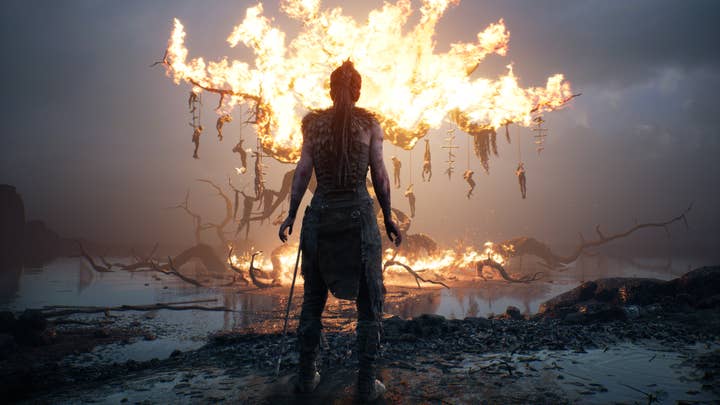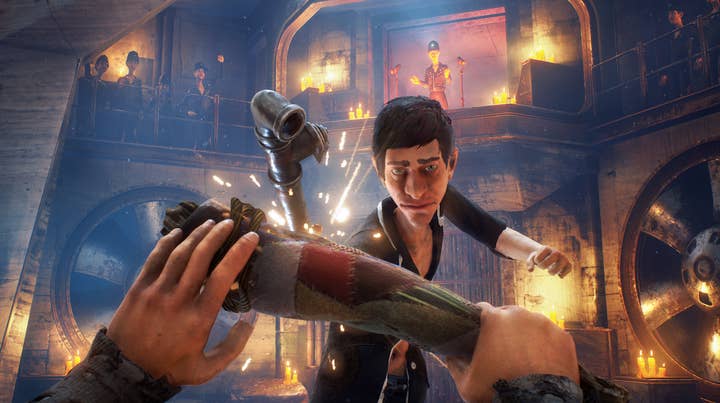Why Xbox bought Ninja Theory
Microsoft explains why mid-sized studios are important to its Game Pass subscription service
When it comes to business announcements, you don't get much bigger than Xbox revealing five new studios at E3.
It was a power play from a company eager to reclaim lost market share, and a commitment to gaming by Microsoft's senior management team.
Yet what was also surprising were the types of studio that it had picked up. Out of the four developers acquired (the fifth is a whole new team), you'd only really class one as a AAA studio - Playground Games. The other three - Ninja Theory, Compulsion Games and Undead Labs - are mid-sized businesses. They make unique games with small(ish) teams in a relatively short time span. If you thought these companies were acquired to produce the sort of God of War-sized content that has served PlayStation so well this generation, then you're overestimating the scale of these outfits.
Speaking to GamesIndustry.biz, head of Microsoft Studios Matt Booty explains that the likes of Ninja Theory produce a certain type of content that should prove crucial in widening the appeal of the firm's subscription service Game Pass.

"When we start to think about Game Pass, what really is the driver for that is content. When you think about our existing content as it relates to Game Pass... you can see that we're fortunate to have some really large franchises, with Halo, Gears of War, Forza, Minecraft, Age of Empires... these are all well established franchises. I use the word franchise deliberately, because these games are typically multi-platform, many of them have a presence off of Xbox, they have millions of players and iterations of the game going back a decade or more.
"At the other end of the spectrum, we've got the ID@Xbox program, which is bringing in hundreds of new games from smaller indies. We've had a lot of success there. But both of those leave a little bit of a gap in terms of variety and also cadence of content.
"We believe that Game Pass is fantastic for our players because of the ability to discover games and the chance to circle back on games that they missed when they first came out. They're also being exposed to things that, because it's available on Game Pass, they might like to try and maybe become a fan of. We think that what drives a lot of that is variety and creativity. So when we think about: 'Why Ninja Theory?' They really just fit into that category of developers that's getting harder and harder to sustain in the industry. A developer that is right on the cusp of large AAA content, making very well-crafted content. I don't think we'd use indie to describe Ninja Theory. But at the same time, it's not the same as a studio that has multiple hundreds of people working on the next iteration of a AAA franchise, like a Halo.
"We started looking at studios that are built around creative leads and people. An amazing thing about Ninja Theory is that it is very clear that the studio orbits around ideas and creativity, and the characters, storytelling and settings really come first for them. That just meshes really well with our desire to provide our players, especially those in Game Pass, with content that is new, unique, has variety and sits outside of the stuff we are doing with our bigger franchises."
It's telling how Booty is using 'Game Pass' rather than 'Xbox One' in his answers. It's clear the subscription service is taking on a far more prominent role within the Xbox business.
"We have an interest in studios that fit this criteria of 50 to 100 people, who are making games on a two to three year cadence, and have content that we think will be of interest to our Game Pass subscribers."
In that context, these mid-scale studios could play a vital role. If you look at Netflix as a comparative subscription model, the content it provides varies from major productions, to legacy shows licensed from elsewhere, to unusual and experimental series (which are still made on a decent budget). It's the big shows like The Crown that draw people in, but it's everything else that keeps them from unsubscribing once they've binge watched the series.
This certainly appears to have improved the quality and originality of TV. Now shows that might never have got commissioned because they don't attract enough viewers (and therefore enough advertising dollars) are being made and finding decent audiences simply by being available as part of the subscription. These are the shows that keep people engaged as they await the next Stranger Things.
Microsoft will hope the same will be true of Game Pass; people come in for Sea of Thieves, but stick around for Hellblade. So with that in mind, is Microsoft keeping its cheque book out to buy more mid-tier studios? Or is the shopping done?
"I don't want to seem like we're going out to fill a quota," he says. "It's not about filling a spreadsheet by any means. We will, however, have an interest in studios right now that fit this criteria of 50 to 100 people, who are making games on a two to three year cadence, and have content that we think will be of interest to our Game Pass subscribers. That means content that is a little different to what our big AAA franchises can deliver.
"One of the fantastic things about Game Pass is that it can support different kinds of content."
Ninja Theory and Compulsion Games, in particular, also add something different in terms of the narrative driven, single-player nature of their titles. Recent years for Microsoft has been led by service-based and multiplayer titles, including recent launches of Sea of Thieves, PUBG and State of Decay 2, plus the incoming Forza Horizon 4 and Crackdown 3.

"The sort-of characterisation of an over-focus on multiplayer, social games or games-as-a-service... I don't know if that's always an accurate representation of what we've been building internally," Booty explains. "Certainly gaming is social - watching, streaming, broadcasting is a huge part of it. Multiplayer games, online play, esports, we all know how important these things are. But that's never been the intention to exclude a certain type of content.
"State of Decay is quite a social game in terms of playing with teams. And as we work with Undead Labs going forward, and we're looking at the next iteration of State of Decay, we should expect it to steer towards more persistent worlds, bigger communities and more online play. But that doesn't mean the next games coming out of Compulsion or Ninja Theory wouldn't be more narrative-based or more single player.
"I have this framing of people, teams and ideas. What we don't want is a situation where we've got this spreadsheet of certain type of games where we need a platformer, a kids mascot game, three shooters, two racing games... I don't want to get into that. I think that good content comes when you supply support to creative people who have got fantastic teams, and then can go off and execute on ideas. It goes very deliberately in that order. We are really not interested in steering any of the studios we've acquired into a certain portfolio objective."
Booty insists that there's no desire from Xbox to make any fundamental changes to these studios. The plan is to help them if they need it, eliminate the financial concern, but otherwise leave them to do what they've always done.
"I was thinking about how the cliche would be to show up [at Ninja Theory] and say: 'Welcome to the family'. But I don't know if that sends the right message."
"Our plan for the studio in terms of integration is very much the same with what we did with Mojang and Minecraft. Which is a very, very minimal level of integration. We are not trying to come in and change the culture. We're not trying to overdo the Microsoft presence. But what we do is make the studio feel supported, empowered and capable of focusing entirely on the content, without needing to worry about the other day-to-day realities.
"I think the main thing with Ninja Theory, is that it is getting more difficult to maintain a studio of that size - of about 100 people - making games that take between two/two and a half years. It's tough. The push for those studios is to orient toward very high production values, and they actually end up in a sphere where they're being compared to AAA. But they're clearly bigger and have more substantial funding needs than a typical small indie. So our goal really is to be able to empower them, support them and fund them, to take the step to whatever their next level of evolution is. We want to free them from worrying about where the next project is coming from, and what work-for-hire stuff they might need to take on."
He continues: "This afternoon I'm getting on a plane to visit Nina and Tameem and the folks at Ninja Theory. This will be the first time that I'll be meeting a lot of people at the studio. I was thinking about how the cliche would be to show up and say something like: 'Welcome to the family'. But I don't know if that sends the right message. It's not our intention to pull these studios in and start putting Xbox posters up everywhere. It's more about giving them the support so that they can focus entirely on making game, and to relieve some of the tension that I think exists for a studio of that size."
Two of the four studios acquired are based in the UK, which means a huge chunk of Microsoft's first-party development now takes place in the country. Currently announced right now is Forza Horizon 4, Battletoads, Crackdown 3 and the continued development of Sea of Thieves.
"The UK is a place where game development got started early," Booty explains. "It's clear that it's supported in terms of universities and programmes that generate young talent. It's clear that it's got support in terms of the economy and the government. We're fortunate to have our hub there with Rare, and it is certainly - from an operations point-of-view - always a benefit when we can have multiple studios clustered around one proximity. It makes it easier to visit and easier for the studios to connect with each other. That doesn't mean that we won't have studios in other places. We're not looking to over-concentrate in the UK. It's more that we're after creative people, and the UK happens to foster and support a lot of creative teams."

Creativity is the key element behind Microsoft's new acquisitions. Previously, most of Microsoft's studios were centralised around a single IP - Turn10 with Forza, 343 with Halo, Mojang with Minecraft and The Coalition with Gears of War. Rare is the notable exception for almost deliberately not working on established brands.
These new studios are not expected to become franchise studios, either. Compulsion Games was not picked up for We Happy Few, and Ninja Theory was not bought for Hellblade. Rather, it's what those games represent that most excites Microsoft.
"In the case of Compulsion Games, we think that We Happy Few is a fantastic game. It has a very interesting, provocative storyline and core idea. But our focus is what is going to be the next game.
"With Ninja Theory, we look at Hellblade as an example of the level of craft and production value that Ninja Theory can bring. It is stunning bordering on staggering the level of production quality that they were able to deliver considering the size of the team. That was a credibility builder, a calling card if you were, for the content they can create.
"If Ninja Theory decides that one of the things they want to work on is a Hellblade sequel, we'd be thrilled. However, we will be looking to new games and new IP from the studios, particularly as it relates to building up our content pipeline into Game Pass."
